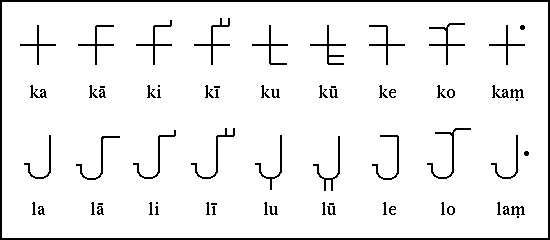#83 Govindaswamy..-> Thank you Sir. To the point and precise. I hope that you can read Thamizh. Permit me to share this article on MS and Grantha Lipi . ... (Rajendran is son of Kalki. and Vijaya , younger sister of Radha Viswanathan,,,).
https://sites.google.com/site/homage2ms ... miniscence
( needs correcting the words in one or two places..typos)
"பஞ்சாங்கத்தைப் படித்தே தீருவது” என்று கையில் வாங்கியதும் பிாித்தேன். பிாித்த பக்கத்தில் எனக்குப் புாியாத லிபியில் ஏதோ எழுதப்பட்டிருந்தது!“இது என்ன, கிரந்த எழுத்தா?” என்று கணேச சாஸ்திாிகளைக் கேட்டேன். “ஆமாம்” என்றார். “கொஞ் சம் படிங்களேன், கேட் போம்” என்றேன். அவர் சில வாிகள் படித்து நிறுத்தி னார்.“அம்மாவுக்கு கிரந்த எழுத்து நன்றாகப் படிக்கவும் எழுதவும் தாிெயும்” என்றாள் விஜயா.
“நிஜமாகவா?” என்று நான் ஆச்சர் யத்துடன் அவளைப் பார்த்தேன். ‘எம்.எஸ். அம்மா பற்றி தாிெந்து கொள்ள வேண்டி யது இன்னும் எவ்வளவோ இருக்கிறது போலிருக்கே’ என்று தோன்றியது “எப் போது கற்றுக் கொண்டாள்?”“எப்போது, யாாிடம் என்பதெல்லாம் தாிெயாது. சிறுமியாக மதுரை யில் இருந்த போதே எழுதப் படிக்க பழகி இருக்கிறாள்.”... Not a translation.. Rajendran tried to read the 'Panjangam'. but found the page containing some unknown script. He asked Ganesa Sastrikal, if it was Grnatha Lipi. The Sartikal read a few lines. Vijaya intervened saying' Amma knew to read and write Grantha lipi very well' . Rajendran was in wonder. and 'Really!' felt that there were many things to be learned about MS Amma'. and asked when did she learn.
Vijaya replied. ' I dont know when and how but she learned it in tender childhood itself' "
--------------------------------------------------------------------------------------------------------------------------------------
2) here follows an excerpt from MS-Rminiscences as told by herdelf ' by Gowri. ( being translated now in tamil by a friend , will be hopefully ready soon).. "One day an old man walked down the street and passed me by. He wore a saffron dhoti and ash marks on forehead and arms, a rudraksha round his neck. He carried a bronze jug, the kamandala. I don’t know why, but I liked him on sight. He looked pious and kind-hearted. 1 continued to see him everyday after that—fresh from his bath, with the same sweet smile for me.
One day he stopped. ‘Child, I want to teach you. Will you learn?’ he asked. I nodded happily. He promptly sat down on the doorstep. He closed his eyes, folded his hands (I did the same) and began with a shloka,’ Ghrita guda payasam
What do you think he taught me? Not Sanskrit, the language of the scriptures. Not Tamil, my mother tongue. He taught me a script called Grantha—so old that nobody uses it anymore. You can find it only in old books, and on the walls of temples. Or on copper plates which were used in olden days to keep accounts and records!
My family watched these ‘classes’ with astonishment. Perhaps they were amused by this white-haired man teaching a tiny tot like me. But no one stopped us. In those days, old and learned persons were respected, even if they were poor wandering souls. But Vadiva(
ms-sister) and Sakti(
ms-brother) found it impossible not to laugh when they saw him. They teased me dreadfully. Sakti started referring to him as ‘Old dhritakula payasam’, after the funny sounding prayer he recited each day. But we continued our classes till the old man went back to Benares, from where he had come south on a pilgrimage. That is how an old man whose name I never knew, became my first guru, and Grantha the first script I learnt!
------------------------------------------------------------------------------------------------------------------------
(translation by Nithya-Arunan) "அப்படியொரு நாளில் அத்தெரு வழியே வந்த பெரியவர் ஒருவர் என்னைக் கடந்து சென்றார். அவர் காவி உடை தரித்தும், நெற்றியிலும் கைகளிலும் திருநீறுப் பட்டையிட்டும், கழுத்தில் ருத்திராட்சை மாலையணிந்தும் தோற்றமளித்தார். அவர் கைகளில் கமண்டலமும், தண்டமும் இருந்தன. ஏனென்று அறியவில்லை, முதல் பார்வையிலேயே அவர் மீது மரியாதை உண்டானது. பக்தியும், கருணையும் அவரில் குடிகொண்டிருந்தது. அன்றிலிருந்து ஒவ்வொரு நாளும் அவர் குளித்துத் திரும்புகையில் கனிவான புன்னகையுடன் என்னைக் கடந்து சென்றார். ஒருநாள் சற்றே நின்ற அவர், "குழந்தாய்! உன்க்கு கற்பிக்க விழைகிறேன், உன் விருப்பமென்ன?" என வினவினார். நான் மகிழ்வுடன் சம்மதித்தேன். உடனே அவர் வாசற்படியில் கைகளை மடித்து, கண்களை மூடி அமர்ந்து, "ஜிஹரித குட பயசம்..." எனும் மந்திரத்தை உச்சரிக்கத் தொடங்கினார். நானும் அவரைப் பின்தொடர்ந்து அவ்வாறே செய்யலானேன்.
அவர் என்னக்கு கற்பித்தது என்னவென்று அறிவீர்களா? வேதங்களின் மொழியான samskrutham அல்ல! நம் தாய் மொழியான தமிழும் அல்ல! அவர் எனக்கு கற்பித்தது grantham எனப்படும் மிகப் பழமையான, இன்று நடைமுறையில் மறைந்துபோன குறிப்பு மொழி! மிகப்பழம் புத்தகங்களிலும், கோவில் கல்வெட்டுகளிலும் மட்டுமே இன்று அவற்றை உங்களால் காண முடியும். இல்லையேல் பண்டைய காலங்களில் கணக்கெழுத பயன்படுத்திய செப்புப் பட்டயங்களில் காணக்கிடைக்கலாம். என் குடும்பத்தினர் இந்நிகழ்வுகளை மிகுந்த ஆச்சரியத்தோடு கவனித்தனர். சொல்லப்போனால் அவ்வயோதிகர் எனைப் போன்றதொரு சின்னஞ் சிரியாளுக்கு கற்பித்தமை அவர்களுக்கு வேடிக்கையாய் இருந்தது. இருப்பினும் எவரும் எங்களைத் தடுக்க முற்படவில்லை. அந்த நாட்களில், வயதில் முதிர்ந்த கற்றறிந்த சான்றோர்கள், ஏழ்மையில் உழன்றிருந்தாலும் நன்மதிப்பும் மரியாதையும் பெற்றிருந்தனர். ஆனாலும், அவரைப் பார்க்கும் பொழுதெல்லாம் வடிவு மற்றும் சக்தியால் சிரிப்பை கட்டுப்படுத்த முடியவில்லை. அவர்களிருவரும் என்னை ஏளனம் செய்யலானார்கள். ஒவ்வொரு நாளும் பிரார்த்தனையில் ஓதும் பொழுதும் அவர் எழுப்பும் விசித்திர ஒலியை கேலிசெய்யும் வகையில் சக்தி அவரை "பழைய திரிதகுல பயசம்" என அழைக்கத் தொடங்கினான். இருந்தபோதிலும், அவர் மீண்டும் பனாரஸ் திரும்பும் வரை எங்கள் வகுப்புகள் தடையின்றி தொடர்ந்தன. இவ்வாறே பெயர் அறியா அப்பெரியவர் என் முதல் ஆசான் ஆனார். மேலும் க்ரந்தம் நான் கற்றறிந்த முதல் மொழியானது."
------------------------------------------------------------------------------------------
May be of interest ( this is a draft.. kindly ignore minor typos)
